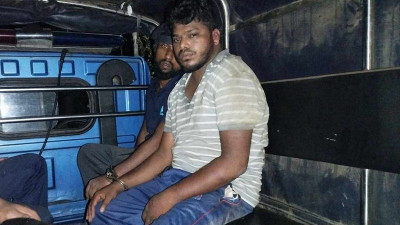Myanmar's Muslim-minority Rohingya community is once again under threat of attacks and displacement as fighting between a powerful ethnic army and the country's ruling junta escalates in the western state of Rakhine, according to UN and aid agencies.
Tens of thousands of Rohingya are estimated to have fled for safety towards neighbouring Bangladesh since mid-May, which is reluctant to accept more refugees, and many of those remaining in Rakhine are in dire need of humanitarian aid.
The Arakan Army (AA) claimed control of Buthidaung town earlier in May following fighting during which the ethnic army was accused of singling out Rohingya community members. The AA denies the charges.
Reuters could not independently verify the claims, and a junta spokesperson did not respond to requests for comment.
The AA is now bearing down on the border town of Maungdaw, also home to a large Rohingya population, that the Myanmar junta will likely attempt to hold, raising the spectre of more serious violence.
"We see clear and present risks of a serious expansion of violence as the battle for neighbouring Maungdaw town has begun - where the military maintains outposts and where a large Rohingya community lives," a spokesperson for the UN High Commissioner for Human Rights said.
The Rohingya have faced decades of persecution and, after a 2017 crackdown by the military, nearly one million fled to Bangladesh, where many now live in crowded refugee camps.
Mohammed Taher, a Rohingya refugee in Bangladesh, said he had recently spoken to a friend in Maungdaw, who described the community living in fear.
"Many want to flee from Rakhine but Bangladesh is not opening its door for Rohingya," Taher said.
Recent fighting has forced some 45,000 Rohingya to flee to an area along the Naf river on the border, according to a UN estimate.
"No Rohingya will be allowed to enter Bangladesh," a senior Bangladesh border guard official told Reuters last week.
Myanmar has been in turmoil since a 2021 military coup, which spurred a grassroots armed resistance that is fighting the junta alongside long-established ethnic minority rebel groups.
'CAUGHT IN THE MIDDLE'
The fighting in Rakhine broke out last November when a ceasefire between the AA and the junta collapsed, leading to a string of battlefield successes for the rebels.
"Faced with mounting losses in Rakhine, the regime has resorted to arming members of the Rohingya ethnic minority to counter the Arakan Army's advance," Morgan Michaels of the International Institute for Strategic Studies said in a May report.
"The AA has reacted with inflammatory rhetoric and violence directed at the Rohingya."
Amid the renewed conflict, Rohingya civilians are "increasingly being caught in the middle," the United Nations Office for the Coordination of Humanitarian Affairs (OCHA) said in its latest report last week.
The agency estimates that over 350,000 people are displaced across Rakhine after years of conflict, many of whom do not have access to basic services.
"We are witnessing a near total absence of humanitarian assistance for communities who rely on it," medical charity Medecins Sans Frontieres said, adding that hospitals in Buthidaung and Maungdaw were closed.
The AA, which has a goal to form an autonomous state, has warned that more battles are coming, asking civilians in Buthidaung, Maungdaw, and Thandwe to dig bomb shelters or evacuate to safer areas.
The group, which has denied it has targeted the Rohingya, has also asked for international aid for some 200,000 internally displaced people that it says are sheltering in areas under its control in Buthidaung and Maungdaw.
"The situation is incredibly fraught and dangerous," said Scot Marciel, a former U.S ambassador to Myanmar.
"In some ways, this is an early test of whether a post-military-rule Rakhine State with significant autonomy can work."



